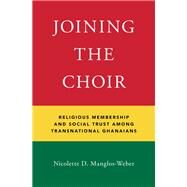Joining the Choir Religious Membership and Social Trust Among Transnational Ghanaians
, by Manglos-Weber, Nicolette D.- ISBN: 9780190841041 | 0190841044
- Cover: Hardcover
- Copyright: 4/2/2018
Immigration and race are contentious issues in North America. As a result, immigrants from Ghana and other countries of West Africa confront major challenges in the social context of the United States, even as their experiences and accomplishments confound stereotypes. Religious congregations have often helped immigrants navigate the tricky waters of integration in the past; yet how do these particular black immigrants approach organized religion in light of their identities and aspirations? What are they looking for in religious membership, and how do they find it?
In Joining the Choir, Nicolette D. Manglos-Weber takes a deeply personal look at the lives of a few central characters in Accra, Ghana and Chicago, Illinois, examining what religious membership means for them as Christians, transnational Ghanaians, and aspirational migrants. She sheds light on their search for people they can trust and their desires to transcend divisions of race, ethnicity, and nationality in the context of Evangelical Christianity. Her characters are complex, motivated, and adaptable people for whom religious membership answers some questions of integration and raises others.
The stories of these migrants show how racial divides are subtly perpetuated within congregations in spite of hopes for religious-based assimilation. Yet they also reveal the potential of religious-based personal trust to bridge those divides, as an imaginative and symbolic leap of faith with the unknown stranger. Finally, their stories highlight the continuing role of religion as a portable basis of trust in the modern world, where more and more people live between nations.
In Joining the Choir, Nicolette D. Manglos-Weber takes a deeply personal look at the lives of a few central characters in Accra, Ghana and Chicago, Illinois, examining what religious membership means for them as Christians, transnational Ghanaians, and aspirational migrants. She sheds light on their search for people they can trust and their desires to transcend divisions of race, ethnicity, and nationality in the context of Evangelical Christianity. Her characters are complex, motivated, and adaptable people for whom religious membership answers some questions of integration and raises others.
The stories of these migrants show how racial divides are subtly perpetuated within congregations in spite of hopes for religious-based assimilation. Yet they also reveal the potential of religious-based personal trust to bridge those divides, as an imaginative and symbolic leap of faith with the unknown stranger. Finally, their stories highlight the continuing role of religion as a portable basis of trust in the modern world, where more and more people live between nations.







